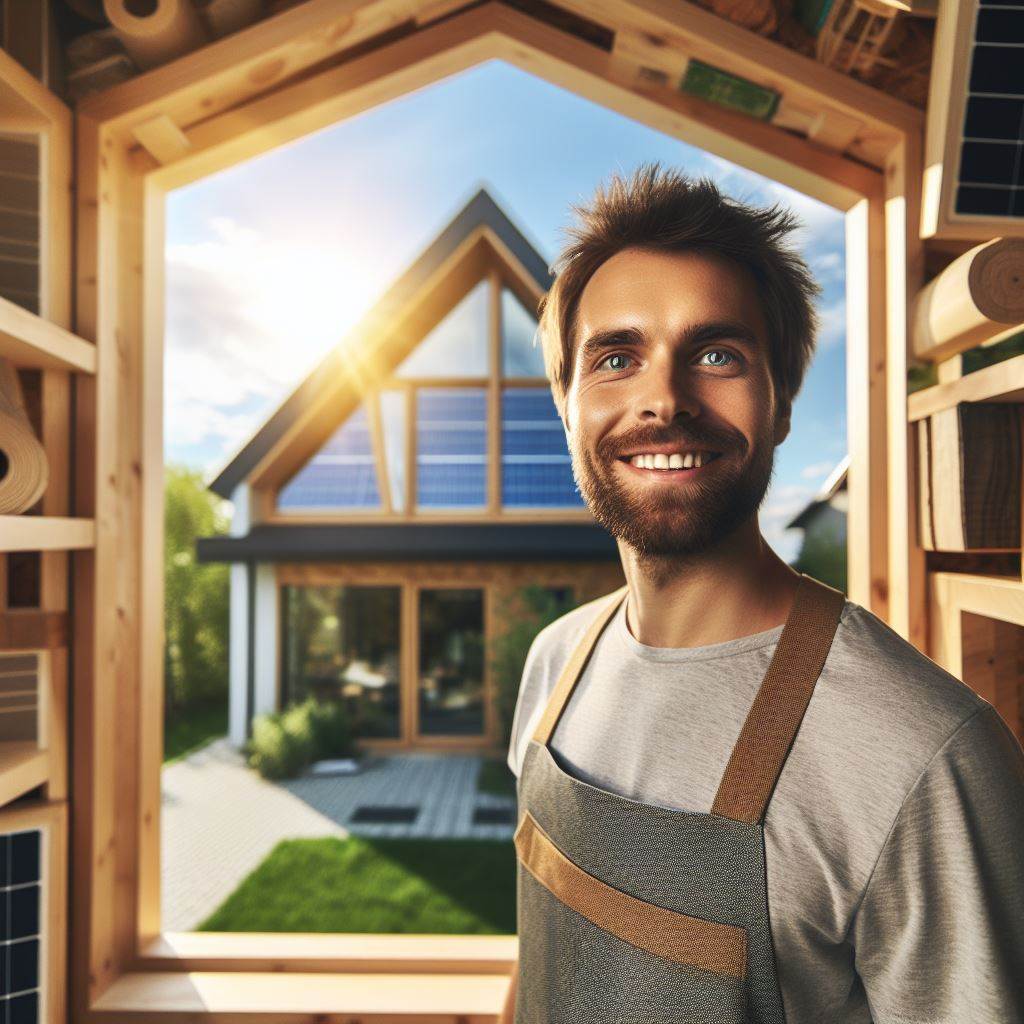Introduction
Smart homes represent the epitome of technological advancement in residential living, seamlessly integrating various devices and systems to create an environment that is not only convenient but also intelligent.
These homes are equipped with interconnected devices and sensors that can be controlled remotely by smartphones, tablets, or voice commands.
From adjusting the thermostat to monitoring security cameras, smart homes offer unparalleled convenience and efficiency.
The importance of smart homes in the real estate industry cannot be overstated.
As technology continues to permeate every aspect of our lives, homebuyers are increasingly seeking properties that offer smart features.
Smart homes enhance the quality of life by providing comfort, convenience, and security.
They also appeal to environmentally conscious buyers by offering energy-saving solutions such as smart thermostats and lighting systems.
Additionally, smart homes command higher resale values and attract a broader pool of potential buyers, making them highly desirable in today’s competitive real estate market.
In this blog post, we will delve deeper into the concept of smart homes, exploring their various components and functionalities.
We will discuss the different types of smart devices available on the market and how they can be integrated to create a fully automated home environment.
Furthermore, we will examine the impact of smart homes on property values and the overall real estate market.
Finally, we will explore some of the challenges and considerations associated with implementing smart home technology and offer practical tips for homeowners looking to make their homes smarter.
Join us as we embark on a journey into the future of real estate with smart homes leading the way.
Benefits of smart homes in real estate
In the evolving landscape of real estate, smart homes are revolutionizing the way people live.
These futuristic dwellings offer a plethora of benefits that not only enhance everyday living but also contribute to a sustainable future.
Increased energy efficiency
One of the most significant advantages of smart homes is their increased energy efficiency.
With smart thermostats and energy monitoring systems, homeowners can regulate their energy usage more effectively, leading to reduced waste and lower utility bills.
Moreover, automated lighting and appliances further contribute to energy conservation by intelligently adjusting usage based on occupancy and preferences.
Enhanced security and safety
In addition to energy efficiency, smart homes prioritize security and safety.
Smart locks and video doorbells provide homeowners with peace of mind, allowing them to monitor and control access to their property remotely.
Motion sensors and CCTV systems add an extra layer of protection, deterring potential intruders and alerting homeowners to any suspicious activity.
Improved convenience and comfort
Beyond security, smart homes offer unparalleled convenience and comfort.
Voice assistants like Alexa and Google Assistant enable hands-free control of various household tasks, from adjusting the thermostat to playing music.
Meanwhile, home automation hubs centralize control over smart devices, allowing for seamless integration and effortless management of the entire home ecosystem.
With remote access and control capabilities, homeowners can monitor and manage their homes from anywhere in the world, enhancing convenience and peace of mind.
Potential cost savings for homeowners
Moreover, the potential cost savings associated with smart homes make them an attractive investment for homeowners.
By optimizing energy usage and reducing utility expenses, smart technologies can lead to substantial long-term savings, making the upfront investment worthwhile.
In essence, the benefits of smart homes in real estate are undeniable.
From increased energy efficiency to enhanced security and convenience, these innovative properties offer a glimpse into the future of modern living.
As technology continues to advance, smart homes will undoubtedly play a crucial role in shaping the future of the US real estate market.
Read: 2024’s Top Green Building Trends in the US
Market trends and adoption of smart homes
The concept of smart homes, where devices and appliances are connected to the internet, allowing for monitoring and control through a smartphone or computer, is gaining significant popularity in the US real estate market.
As technology advances and becomes more accessible to the average consumer, the demand for smart homes is rapidly increasing.
Growth of the smart home market
Increasing demand from tech-savvy buyers
As technology becomes an integral part of our lives, more buyers are seeking homes equipped with smart features.
They value the convenience, efficiency, and security provided by these technologies.
Integration of smart home technology into new constructions
Homebuilders are recognizing the demand for smart homes and are incorporating smart technology into their new construction projects.
This integration allows for seamless integration of smart devices and systems into the home during the building process.
Regional differences in smart home adoption
Urban areas vs. suburban and rural areas
The adoption of smart home technology varies across different regions.
Urban areas tend to have higher adoption rates due to the availability of infrastructure and a higher concentration of tech-savvy individuals.
Suburban and rural areas may have slower adoption rates, primarily due to limited infrastructure and a lower demand for smart features.
Factors Influencing Adoption Rates
Several factors influence the adoption rates of smart homes.
The cost of installation and maintenance, internet connectivity, and familiarity with technology play a significant role in determining the rate at which smart home technology is adopted in a particular region.
Impact of smart home features on property values
The presence of smart home features can have a positive impact on property values.
Buyers are willing to pay a premium for homes equipped with these features as they offer convenience, energy savings, and enhanced security.
The value of a smart home extends beyond the tangible features; it represents a modern and technologically advanced lifestyle that appeals to many buyers.
In fact, the market for smart homes is rapidly growing in the US real estate industry.
The demand from tech-savvy buyers, integration into new constructions, and regional differences in adoption rates all contribute to the market’s growth.
Furthermore, the inclusion of smart home features can increase property values, making it a beneficial investment for homeowners.
As technology continues to advance and become more accessible, the future of US real estate undoubtedly lies in smart homes.
Read: US Commercial Real Estate: Interest Rates
Challenges and considerations for real estate professionals
Technical complexities and installation requirements
Real estate professionals must navigate the technical complexities of smart home systems.
Installing smart home devices and integrating them into properties can be challenging.
Knowledge about networking, automation, and IoT is necessary to ensure successful installations.
Professionals need to understand the specific requirements and compatibility of different smart home devices.
Compatibility issues with different smart home platforms
With numerous smart home platforms available, compatibility issues can arise.
Real estate professionals should be familiar with the major smart home ecosystems.
They must address compatibility concerns when recommending or installing smart home solutions.
Understanding the interoperability between platforms is essential to provide accurate advice to clients.
Privacy and cybersecurity concerns
Smart homes generate vast amounts of data, raising privacy concerns for homeowners.
Real estate professionals need to educate clients about data collection and potential risks.
Understanding cybersecurity measures is crucial to protect smart home systems from hacking attempts.
Professionals should stay updated on the latest security practices to safeguard their clients’ privacy.
Educating clients about smart home integration
Real estate professionals play a vital role in educating clients about smart home integration.
Explaining the benefits and potential drawbacks of smart home technology is essential.
They need to help clients make informed decisions based on their lifestyle and preferences.
Providing training and resources to clients can facilitate a seamless transition into smart home living.
While smart homes offer numerous advantages, real estate professionals face challenges in navigating technical complexities, compatibility issues, privacy concerns, and educating clients.
However, by staying updated on the latest trends and technologies, professionals can harness the full potential of smart homes and provide valuable guidance to their clients.
Read: 2024 Healthcare Real Estate in the US

Future prospects of smart homes in US real estate
In today’s fast-paced and tech-driven world, smart homes are rapidly becoming the future of the US real estate market.
With advancements in artificial intelligence (AI) and machine learning, integration with renewable energy sources and smart grids, potential for personalized home experiences through data analytics, and a shift in buyer preferences towards smart homes, the future prospects of this industry are promising.
Advancements in artificial intelligence and machine learning
AI and machine learning technologies are revolutionizing the way smart homes operate.
Intelligent systems can learn and adapt to homeowners’ behaviors, making their lives more convenient.
Home automation, security, and energy management systems can be controlled through voice commands or mobile apps.
Smart personal assistants like Amazon Alexa and Google Assistant are becoming household staples.
Advanced AI algorithms can analyze data and make predictions for homeowners, enhancing their quality of life.
Integration with renewable energy sources and smart grids
Smart homes are also embracing sustainable technologies, such as solar panels and energy-efficient appliances.
Integration with smart grids allows homeowners to optimize their energy consumption and reduce utility bills.
Energy storage solutions like batteries enable homeowners to store excess power from renewable sources.
Smart homes can balance energy usage during peak hours, contributing to a more reliable and efficient energy grid.
With the potential for electric vehicle charging stations, smart homes are paving the way for a greener future.
Potential for personalized home experiences through data analytics
Smart homes collect vast amounts of data on homeowners’ behaviors, preferences, and routines.
Data analytics can provide valuable insights to enhance personalized experiences.
Smart homes can automatically adjust lighting, temperature, and music preferences to suit individual preferences.
Homeowners can receive personalized recommendations for energy-saving practices and lifestyle improvements.
Data-driven insights can also help identify potential maintenance issues before they become major problems.
Shift in buyer preferences towards smart homes
There has been a noticeable shift in buyer preferences towards homes equipped with smart technologies.
Younger generations, such as millennials and Generation Z, are particularly interested in smart home features.
Buyers see smart homes as a way to enhance convenience, safety, and energy efficiency.
Real estate developers and agents are embracing smart home technologies to appeal to this growing market.
As smart home technology becomes more affordable and accessible, its demand is expected to continue rising.
In general, the future prospects of smart homes in US real estate are bright.
Advancements in AI and machine learning, integration with renewable energy sources and smart grids, potential for personalized home experiences through data analytics, and the shift in buyer preferences towards smart homes are shaping the future of the industry.
As the technology continues to improve and become more affordable, smart homes will likely become the norm rather than the exception in the US real estate market.
Read: Co-Working Spaces: US Market Evolution
Conclusion
Recap of the key points discussed
Throughout this post, we explored the concept of smart homes and their potential impact on the US real estate market.
We discussed how smart home technology offers convenience, security, and energy efficiency, making it a desirable feature for homebuyers.
We also examined the current state of the market and the increasing popularity of smart homes among buyers.
Emphasis on the future role of smart homes in the real estate industry
Smart homes are expected to play a significant role in the future of the real estate industry.
As technology continues to advance and become more accessible, we can anticipate a widespread adoption of smart home features in new constructions and existing homes.
This will result in increased demand for smart home integrations and specialized professionals in the field.
Encouragement for real estate professionals and buyers to embrace smart home technology
Real estate professionals and buyers alike should embrace smart home technology.
For professionals, staying up-to-date with the latest smart home trends and understanding the benefits can help them better serve their clients and meet market demands.
Buyers can enjoy the convenience, security, and potential cost savings that smart homes offer, making their investment worthwhile for the long term.
Smart homes are undoubtedly the future of US real estate.
With the numerous benefits they offer and their increasing popularity, it is essential for real estate professionals and buyers to embrace smart home technology to stay competitive and make smarter investment decisions.




